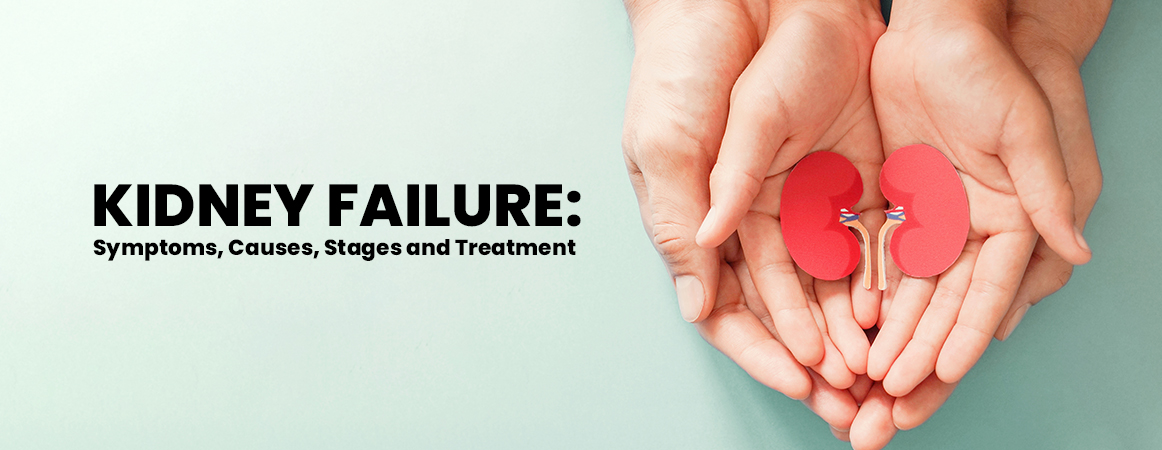Kidney Failure: Symptoms, Causes, Stages and Treatment
Kidney failure, a silent yet impactful health crisis, poses a serious risk to individuals worldwide. Rooted in various causes, from chronic diseases to genetic predispositions, subtle kidney failure symptoms often elude early detection. Fatigue, swelling, and changes in urine color may signify impending issues. Understanding the kidney failure stages, from mild dysfunction to severe impairment, is crucial. This brief exploration seeks to shed light on the insidious nature of kidney failure, emphasizing the importance of awareness and proactive health management.
Symptoms of Kidney Failure
Kidney failure manifests through subtle signs, often overlooked. The following are the kidney failure symptoms:
- Subtle Fatigue: Persistent tiredness may signal early kidney dysfunction.
- Swelling: Edema, especially in the ankles and feet, indicates potential kidney issues.
- Urine Changes: Altered color or frequency may signify compromised kidney function.
- High Blood Pressure: Persistent hypertension could be linked to kidney problems.
- Cognitive Decline: Reduced mental sharpness may be a symptom of kidney impairment.
Causes of Kidney Failure
Various factors contribute to kidney failure.
- Chronic Diseases: Diabetes and hypertension are major contributors.
- Infections: Kidney infections can lead to functional decline.
- Genetic Factors: Inherited conditions may predispose individuals to kidney failure.
- Environmental Toxins: Prolonged exposure or certain medications may accelerate kidney damage.
- Kidney Stones: Formation and recurrent issues can impair kidney function.
Kidney Failure Stages
Kidney failure progresses through stages, ranging from mild dysfunction to complete failure.
- Stage 1-2: Mild dysfunction with subtle or no symptoms.
- Stage 3: Noticeable decline in kidney function, potential symptoms emerge.
- Stage 4-5: Severe impairment, necessitating immediate attention.
- Early Detection Crucial: Regular check-ups are crucial to identify issues before advanced stages.
- Proactive Monitoring: Timely awareness and intervention can prevent progression to severe stages, enhancing the effectiveness of treatment options.
Recognizing Kidney Failure Early
Early detection of kidney failure is crucial for effective intervention. Regular check-ups with a specialist at Memon Medical Institute Hospital and monitoring blood pressure, blood sugar, and urine changes can aid in identifying kidney issues before they escalate. Timely awareness can prevent progression to advanced stages of kidney failure.
Diagnostic Procedures
Physicians employ various diagnostic tools to assess kidney health. Blood tests measure creatinine levels, a waste product indicating kidney function. Urinalysis helps detect abnormalities. Imaging studies like ultrasounds or MRIs provide detailed insights into kidney structure.
Kidney Failure Treatment Approaches
Kidney failure necessitates a multifaceted approach. Comprehensive strategies are vital for effective kidney failure care.
- Dietary Adjustments: Patient well-being is enhanced through dietary changes, emphasizing reduced salt and protein intake.
- Medical Intervention: Medications play a crucial role in helping to control blood pressure and address underlying health conditions.
- Critical Interventions: In certain cases, the imperative need for survival may necessitate procedures like dialysis or kidney transplantation. This multifaceted approach ensures a holistic and individualized response to kidney failure.
Dialysis: Bridging the Gap
Dialysis serves as a lifeline for those with advanced kidney failure. Hemodialysis and peritoneal dialysis are common methods, aiding in the removal of waste and excess fluids from the body. While effective, dialysis is a temporary solution, and transplant remains the ultimate goal.
Kidney Transplantation
For eligible patients, kidney transplantation offers a chance at a renewed life. A compatible donor, either living or deceased, provides a healthy kidney, replacing the failed one. Successful transplants significantly improve quality of life and longevity.
Managing Kidney Failure Long-Term
Managing kidney failure is a lifelong commitment. Regular medical follow-ups, adherence to prescribed medications, and lifestyle adjustments are crucial. Patient education on self-monitoring and recognizing warning signs empowers individuals in their journey against kidney failure.
Preventive Measures and Lifestyle Changes to Prevent Kidney Failure
Preventing kidney failure involves maintaining a healthy lifestyle such as:
- Balanced Diets: Maintain a diet low in salt and protein for kidney health.
- Regular Exercise: Promote overall well-being and support kidney function.
- Hydration: Ensure adequate fluid intake to facilitate proper kidney function.
- Manage Chronic Conditions: Effectively control diabetes and hypertension to reduce kidney failure risk.
- Lifestyle Adjustments: Adopt a healthy lifestyle with mindful choices, contributing to overall kidney health and preventing potential complications.
Embracing Support at MMI
Living with kidney failure can be challenging, both physically and emotionally. Memon Medical Institute and Hospital plays a pivotal role in helping individuals cope with the complexities of the condition. MMI boasts cutting-edge technology and state-of-the-art medical equipment, complemented by a team of highly skilled and experienced doctors.
This advanced infrastructure is dedicated to enhancing kidney health for our patients, ensuring the highest standards of care and innovative medical interventions. Our commitment to excellence in both equipment and medical expertise underscores our unwavering dedication to providing optimal solutions for improved kidney health and overall well-being.
Conclusion
Kidney failure is a formidable health challenge, demanding attention, awareness, and proactive management. Understanding kidney failure symptoms, causes, and kidney failure treatment options empowers individuals to take charge of their health. Regular screenings, timely interventions, and a holistic approach to healthcare are essential in navigating the complex landscape of kidney failure, ensuring a better quality of life for those affected.


